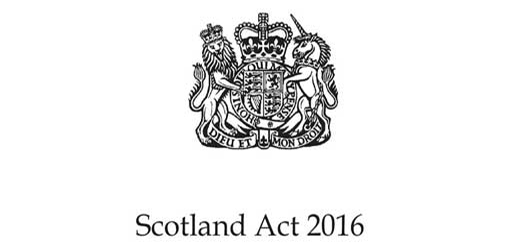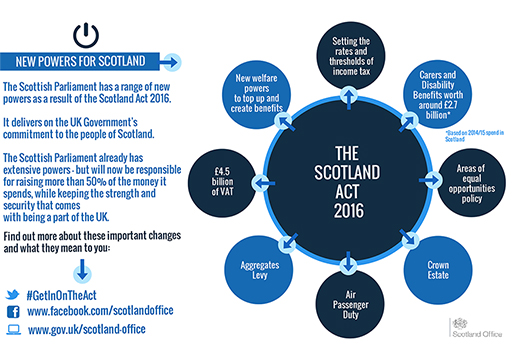3.1 Further additional powers
The Scotland Act 2016 transferred the following additional powers to the Scottish Parliament:
- powers to set rates and thresholds of Income Tax, and devolution of Air Passenger Duty
- some social security powers including disability and carers’ benefits, Winter Fuel payments
- the power to create new benefits in devolved areas and to top up reserved benefits
- the power to adjust aspects of Universal Credit in Scotland including the housing element
- devolution of some employment services
- devolution of the Crown Estate in Scotland
- the arrangements for elections to the Scottish Parliament
- devolution of Tribunals in reserved areas – such as the Employment Tribunals – in Scotland
- devolution of additional powers over equal opportunities, including to legislate for gender balance on public boards
- devolution of British Transport Police.
The powers of the Scottish Parliament have grown since the original devolution settlement contained in the 1998 Scotland Act. The growth of those powers has been incremental (with subsequent Acts in 2012 and 2016) and piecemeal. There are now a number of Acts and other instruments to consider when looking at the powers of the Scottish Parliament.
Box 6 UK Government Policy paper 2010 to 2015 government policy: Scottish devolution
Scotland has two governments: the UK government is responsible for matters including defence, foreign affairs, the economy, social security and the constitution, while the Scottish government is responsible for matters including health, education, justice and policing, and local government.
Although responsibility is divided in this way, the two governments work together on many issues and cooperate to make sure that the devolution settlement is well managed.
The division of responsibilities is not fixed, and it has changed several times since devolution began in 1999.
Activity 1 Reserved or Devolved?
This Activity is designed to provide you with an opportunity to pause and reflect on the information provided so far and to enable you to test your knowledge of reserved and devolved powers. You have engaged with a lot of important information about the powers of the Scottish Parliament.
- Take a few minutes to reflect on what you have read. How did you manage the information presented? Did you find it approachable or did you have to read it several times?
- The list below contains matters which are either devolved or reserved. Based on the knowledge you have gained from your studies indicate by clicking in the appropriate box whether a matter is devolved or reserved.
a.
social security
b.
health
c.
broadcasting
d.
housing
e.
education and training
f.
equal opportunities
g.
miscellaneous matters, such as compiling statistics and keeping public records
h.
defence
i.
planning and the environment
j.
medicines
k.
sport and the arts
l.
aspects of transport (e.g. regulation of air services, rail and international shipping)
m.
the prosecution system and the courts
n.
the constitution
o.
agriculture, forestry and fishing
p.
tourism and economic development
q.
aspects of energy regulation (e.g. electricity, coal, oil and gas and nuclear energy)
r.
trade and industry
s.
employment
t.
financial and economic matters
u.
social work
v.
foreign affairs
w.
Scottish road network, bus policy, and ports and harbours
x.
misuse of drugs
y.
immigration and nationality
z.
local government
aa.
international development
ab.
the Civil Service
The correct answers are b, d, e, g, i, k, m, o, p, u, w and z.
a.
equal opportunities
b.
health
c.
defence
d.
employment
e.
housing
f.
aspects of energy regulation (e.g. electricity, coal, oil and gas and nuclear energy)
g.
financial and economic matters
h.
education and training
i.
foreign affairs
j.
immigration and nationality
k.
planning and the environment
l.
social security
m.
international development
n.
aspects of transport (e.g. regulation of air services, rail and international shipping)
o.
the prosecution system and the courts
p.
agriculture, forestry and fishing
q.
misuse of drugs
r.
medicines
s.
broadcasting
t.
sport and the arts
u.
the constitution
v.
tourism and economic development
w.
the Civil Service
x.
local government
y.
miscellaneous matters, such as compiling statistics and keeping public records
z.
trade and industry
aa.
Scottish road network, bus policy, and ports and harbours
ab.
social work
The correct answers are a, c, d, f, g, i, j, l, m, n, q, r, s, u, w and z.
Comment
- The powers of the Scottish Parliament are set out in Acts of the UK Parliament. Acts of Parliament create law. Those laws tend to be expressed in formal language that is quite different from the language you would find in a novel or newspaper article, and very different from the language in an online blog or tweet. Learning to order information to make sense of it is an important skill. Here the authors chose to take a step-by-step historical approach to build a picture of the powers of the Scottish Parliament. This enabled the incremental nature of those powers to be explained. The incremental nature reflects events such as the independence referendum. Devolution has not been a fixed and settled process and is on-going, reflecting changes within society.
- The Scotland Act 1998 (as amended) specifies those matters that are reserved to the UK Parliament. Matters not reserved by the Scotland Act 1998 (as amended) are devolved to the Scottish Parliament.


